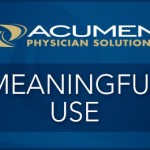 Tomorrow is the first day of September and everyone reading this blog knows what that means…we are one month away from the ICD-10 transition! I don’t want to wear you out with that announcement, but I do want to make sure you have your eyes on the calendar. I, for one, plan to take the month of October off, and leave my cell phone charger behind.
Tomorrow is the first day of September and everyone reading this blog knows what that means…we are one month away from the ICD-10 transition! I don’t want to wear you out with that announcement, but I do want to make sure you have your eyes on the calendar. I, for one, plan to take the month of October off, and leave my cell phone charger behind.
In this post, the ICD-10 heads up is simply a friendly reminder, because today what I have for you is an inside look at the injustices of the meaningful use audit process. For many reasons I have been a fan of the appropriate use of the MU hardship exception by nephrologists. Afterall, this program was never intended to work inside a dialysis facility nor within the walls of a vascular access center. But of course those are important venues of care for the nephrologist, and therein lies the rub.
Audits
As a reminder, CMS is compelled to audit a small percentage of the participants in the MU program. Both hospitals and “eligible professionals” alike are encouraged to maintain supporting documentation for up to six years as we are told that is the timeframe subject to an audit. CMS is rather guarded about how they identify who will be audited or how many hospitals and physicians are targeted. People in the know have suggested somewhere between 5 and 10 percent of the entities attesting for meaningful use will be subject to an audit at some point during the ensuing six years.
MU audits come in two flavors. Pre-payment audits, as the name implies, are audits conducted shortly after you attest for MU and prior to receiving your incentive check. Of note, the last of the incentive checks most nephrologists will see are those that will be paid for successful participation in 2016. After that it’s all about avoiding the MU penalty for participants who are following the Medicare path to MU. The second type of audit is the post-payment audit, and you guessed it, this audit is conducted after you receive your incentive payment for successfully attesting. One might imagine the post-payment audit will ride off into the sunset after 2016 as the payment of an incentive disappears.
Although CMS does not publish how many folks face an audit, and importantly how many fail, last year Steve Spearman successfully filed an inquiry under the Freedom of Information Act and what he uncovered was mind boggling. As it turns out, when hospitals are audited, they rarely fail. But for docs, the MU audit failure rate was in the 21-24% range. Initially it seemed as though many of these failures were due to a misunderstanding on the practice’s part regarding the ins and outs of a security risk analysis. This analysis is a HIPAA requirement which has been in place for over a decade. When you attest for MU you are attesting to the fact that you (or your practice) conducted a security risk analysis. If you face a meaningful use audit, you will be asked to send the auditor a copy of your security risk analysis. If you cannot produce one, you fail the audit.
A crying shame
I am not blogging today about the security risk analysis. Instead, I want to share a far more troubling story. I recently learned of a practice, whose identity will remain confidential, that bent over backwards to do “the right thing”, but at the end of the day CMS brought the hammer down for all the wrong reasons. This is a moderate-sized nephrology practice that had successfully attested for the first stage of MU during the prior three years. Last year they took on the daunting challenge of reporting the Stage 2 objectives. Unlike some nephrology practices around the country that have been led to believe they can exclude dialysis encounters from the MU framework, this practice was savvy enough to understand the MU framework applies to ALL outpatient encounters—every encounter except those which use place-of-service code 21 or 23 (inpatient hospital or emergency room respectively). It was a substantial lift, but the practice collected all of the Stage 2 data for office encounters and dialysis encounters during the third quarter of 2014. Of note, in spite of the fact the practice does not administer immunizations in their office, they went the extra mile by duplicating data entry, recording immunizations administered in the dialysis facility within their office based EHR in order to comply with MU. Unbeknownst to the practice, their local public health authority had changed the format in which they received immunizations, a change which later proved to be an insurmountable problem in the eyes of CMS.
Slow as molasses
About a month after this practice attested, all but one of the nephrologists in this moderate-sized practice received a pre-payment audit request. The practice did what any practice would do, they spent a lot of time and energy collecting the supporting documentation and submitting it within the narrow window required by the auditor. Weeks went by and then the auditor requested additional information, providing another narrow window of response time. Again the practice administrative staff diligently complied with that request and shipped the supplemental data within the required timeframe. For those of you keeping score at home, by now it’s late spring and this practice, like the rest of us, is wondering what the 2015 MU reporting period will be (we still do not know!). Remarkably, the auditors made yet a third request for supporting documentation. Again the practice complied, spending countless administrative hours tracking down the requested data for the audit firm.
When spring turned into summer, this practice still had no word from the firm CMS uses to conduct these audits, so the practice reached out and asked where the audit stood. The response suggested the audit firm had a “contractual issue” with CMS, which had recently been resolved (honest truth, this story is so remarkable that even I could not make it up). Finally, in July the practice was informed that all of the docs had failed the audit. The reason: a technicality related to the handful of immunizations they reported to the public health authority. Immunizations that the public health authority would have otherwise never seen. So here is a practice that did a boatload of work last year now being told that all but one of its docs are not going to be paid the incentive they had worked so hard to secure. Far worse is the fact that the opinion took six months to render and, in a cruel twist of fate, it was rendered AFTER the window to file for the 2016 hardship exception had closed. The practice did what most of us would do, they appealed.
A lack of transparency
If you think the actual audit process is opaque (it is) let me assure you what happens behind the curtain of a meaningful use appeal is virtually invisible. No one knows who conducts the appeal. There are no published guidelines and there is certainly no timeline. For an agency that routinely touts the virtues of transparency, one could easily make the case that a double standard is in play.
The practice put together a very thoughtful appeal letter, which was expeditiously denied. The practice was not certain the body to which they had appealed even read the letter, as there was not a clear explanation why the appeal had been denied.
Hardship deadline
The most devastating part of this story though is the time it took the CMS contracted auditors to respond. The practice received the pre-payment appeal denial EIGHT months after they attested, and they received the initial denial over six months after they received the original audit request—about a week after the July 1 hardship exception deadline. In their appeal they asked the auditors to permit them to file for the hardship. This request was also denied. The practice went through the very heavy lift of reporting the Stage 2 objectives last year when many of the docs could have taken the easy way out. If the appeal process had been faster than cold molasses they would have been afforded the opportunity to file for the 2016 hardship exception. The slow turning wheels behind this process not only denied the practice the modest MU incentive, it put them all on the 2016 penalty list.
Lessons for all
I share this travesty today with the practice’s permission. They want to ensure others are not ensnared by this quagmire. In my view there are several lessons we can learn from this experience:
- The hardship exception related to the lack of certified technology within the dialysis facility or the vascular access center is enjoying increasing popularity among nephrologists. If large numbers of nephrologists appropriately and successfully file for this exception, it is not outside the realm of possibility that CMS/ONC will recognize our specialty as exempt by virtue of the venues of care in which we practice, much like they have done for our radiology, pathology, and anesthesiology colleagues. This program was never intended for the venues of care where we deliver services to the ESRD population. As the incentives decline and the specter of rising penalties looms larger, I suspect nephrologists will flock to this hardship exception.
- The “all or none” requirement of meaningful use is damning in many respects. When a practice goes through what the one above did—successfully completing over 99% of the required work only to see the hammer come down—there is something definitely wrong with the program. Diana recently highlighted H.R. 3309, the Flex-IT 2 Act, one component of which is the elimination of this all-or-none nightmare. If there were ever a time for advocacy, that time is now.
- Lastly, if you plan to participate in the nephrology nightmare known as meaningful use, please make sure you maintain all of the necessary supporting documentation. Per CMS you need to be able to produce it up to six years after you attest, and with the OIG joining the audit team, you can bet they are serious about that timeline. Acumen and every other certified EHR I am aware of will continue to run the certification gauntlet because there will always be at least a few nephrologists who do not qualify for the hardship exception. So all of you will continue to enjoy the benefits of using a certified EHR. But if you attest, do so as though you will face an audit.
I recently traded emails with the MU physician champion from the practice discussed above. Reflecting on the agony his practice endured over the better part of a year, he said, “It’s time we started treating patients again, not denominators.” I could not agree more. This thing has truly gotten out of hand, and our preliminary view of the proposals for Stage 3 do not suggest it will get better any time soon. Pay attention to the lessons above and do what you need to do to avoid falling victim to the perils of a meaningful use audit. If you would like to share your experience for the good of the nephrology community, drop us a note and join the conversation.
 Terry Ketchersid, MD, MBA, practiced nephrology for 15 years before spending the past seven years at Acumen focused on the Health IT needs of nephrologists. He currently holds the position of Chief Medical Officer for the Integrated Care Group at Fresenius Medical Care North America where he leverages his passion for Health IT to problem solve the coordination of care for the complex patient population served by the enterprise.
Terry Ketchersid, MD, MBA, practiced nephrology for 15 years before spending the past seven years at Acumen focused on the Health IT needs of nephrologists. He currently holds the position of Chief Medical Officer for the Integrated Care Group at Fresenius Medical Care North America where he leverages his passion for Health IT to problem solve the coordination of care for the complex patient population served by the enterprise.




Leave a Reply